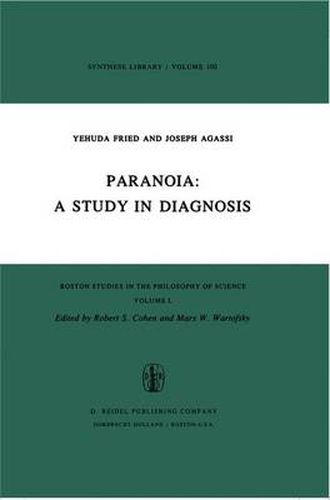Readings Newsletter
Become a Readings Member to make your shopping experience even easier.
Sign in or sign up for free!
You’re not far away from qualifying for FREE standard shipping within Australia
You’ve qualified for FREE standard shipping within Australia
The cart is loading…






This title is printed to order. This book may have been self-published. If so, we cannot guarantee the quality of the content. In the main most books will have gone through the editing process however some may not. We therefore suggest that you be aware of this before ordering this book. If in doubt check either the author or publisher’s details as we are unable to accept any returns unless they are faulty. Please contact us if you have any questions.
There is a curious parallel between the philosophy of science and psychiatric theory. The so-called demarcation question, which has exercised philosophers of science over the last decades, posed the problem of distinguishing science proper from non-science - in par ticular, from metaphysics, from pseudo-science, from the non rational or irrational, or from the untestable or the empirically meaningless. In psychiatric theory, the demarcation question appears as a problem of distinguishing the sane from the insane, the well from the mentally ill. The parallelism is interesting when the criteria for what fails to be scientific are seen to be congruent with the criteria which define those psychoses which are marked by cognitive failure. In this book Dr Yehuda Fried and Professor Joseph Agassi - a practicing psychiatrist and a philosopher of science, respectivel- focus on an extreme case of psychosis - paranoia - as an essentially intellectual disorder: that is, as one in which there is a systematic and chronic delusion which is sustained by logical means. They write: Paranoia is an extreme case by the very fact that paranoia is by definition a quirk of the intellectual apparatus, a logical delusion.
(p. 2.
$9.00 standard shipping within Australia
FREE standard shipping within Australia for orders over $100.00
Express & International shipping calculated at checkout
This title is printed to order. This book may have been self-published. If so, we cannot guarantee the quality of the content. In the main most books will have gone through the editing process however some may not. We therefore suggest that you be aware of this before ordering this book. If in doubt check either the author or publisher’s details as we are unable to accept any returns unless they are faulty. Please contact us if you have any questions.
There is a curious parallel between the philosophy of science and psychiatric theory. The so-called demarcation question, which has exercised philosophers of science over the last decades, posed the problem of distinguishing science proper from non-science - in par ticular, from metaphysics, from pseudo-science, from the non rational or irrational, or from the untestable or the empirically meaningless. In psychiatric theory, the demarcation question appears as a problem of distinguishing the sane from the insane, the well from the mentally ill. The parallelism is interesting when the criteria for what fails to be scientific are seen to be congruent with the criteria which define those psychoses which are marked by cognitive failure. In this book Dr Yehuda Fried and Professor Joseph Agassi - a practicing psychiatrist and a philosopher of science, respectivel- focus on an extreme case of psychosis - paranoia - as an essentially intellectual disorder: that is, as one in which there is a systematic and chronic delusion which is sustained by logical means. They write: Paranoia is an extreme case by the very fact that paranoia is by definition a quirk of the intellectual apparatus, a logical delusion.
(p. 2.